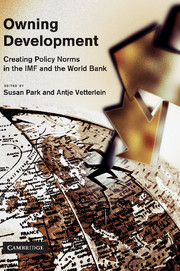Book contents
- Frontmatter
- Contents
- List of figures
- List of tables
- List of contributors
- Preface and acknowledgements
- List of acronyms and abbreviations
- Part One Introduction
- 1 Owning development: creating policy norms in the IMF and the World Bank
- Part Two Norm emergence
- Part Three Norm stabilization
- Part Four Norm subsiding
- Part Five Conclusion
- Bibliography
- Index
1 - Owning development: creating policy norms in the IMF and the World Bank
Published online by Cambridge University Press: 02 December 2010
- Frontmatter
- Contents
- List of figures
- List of tables
- List of contributors
- Preface and acknowledgements
- List of acronyms and abbreviations
- Part One Introduction
- 1 Owning development: creating policy norms in the IMF and the World Bank
- Part Two Norm emergence
- Part Three Norm stabilization
- Part Four Norm subsiding
- Part Five Conclusion
- Bibliography
- Index
Summary
Introduction
How are policies devised by the International Monetary Fund (IMF or the Fund) and the World Bank? Considering the central role played by these two international organizations (IOs) in the post-1945 international economic system, it is not surprising that there is considerable disagreement over what motivates these institutions. For example, critics of the Fund and the Bank argue that they merely do the bidding of their most powerful member, the United States (Babb and Buria 2005: 73; Woods 2006: 379). Indeed this fits current theoretical models that focus on the primacy of (powerful) member states over their IO agents (Hawkins et al. 2006). Others argue that the IMF and the World Bank are purveyors of globalization, and act to further the interests of hegemonic capitalist elites through upholding and extending the capitalist system (Bøås and McNeill 2004; Goldman 2005; Moore 2007; Wade and Veneroso 1998). Still others argue that these organizations have power precisely because they are relatively autonomous in their decision-making, which gives them leeway to determine how to implement their mandates (Barnett and Finnemore 2004; Weaver 2008).
This book takes a different tack. It examines the sources, triggers and mechanisms of change in the IMF's and the World Bank's ideas and policies. It undertakes detailed, fine-grained empirical research into the policy-making processes of the Bretton Woods institutions.
- Type
- Chapter
- Information
- Owning DevelopmentCreating Policy Norms in the IMF and the World Bank, pp. 3 - 26Publisher: Cambridge University PressPrint publication year: 2010
- 16
- Cited by

